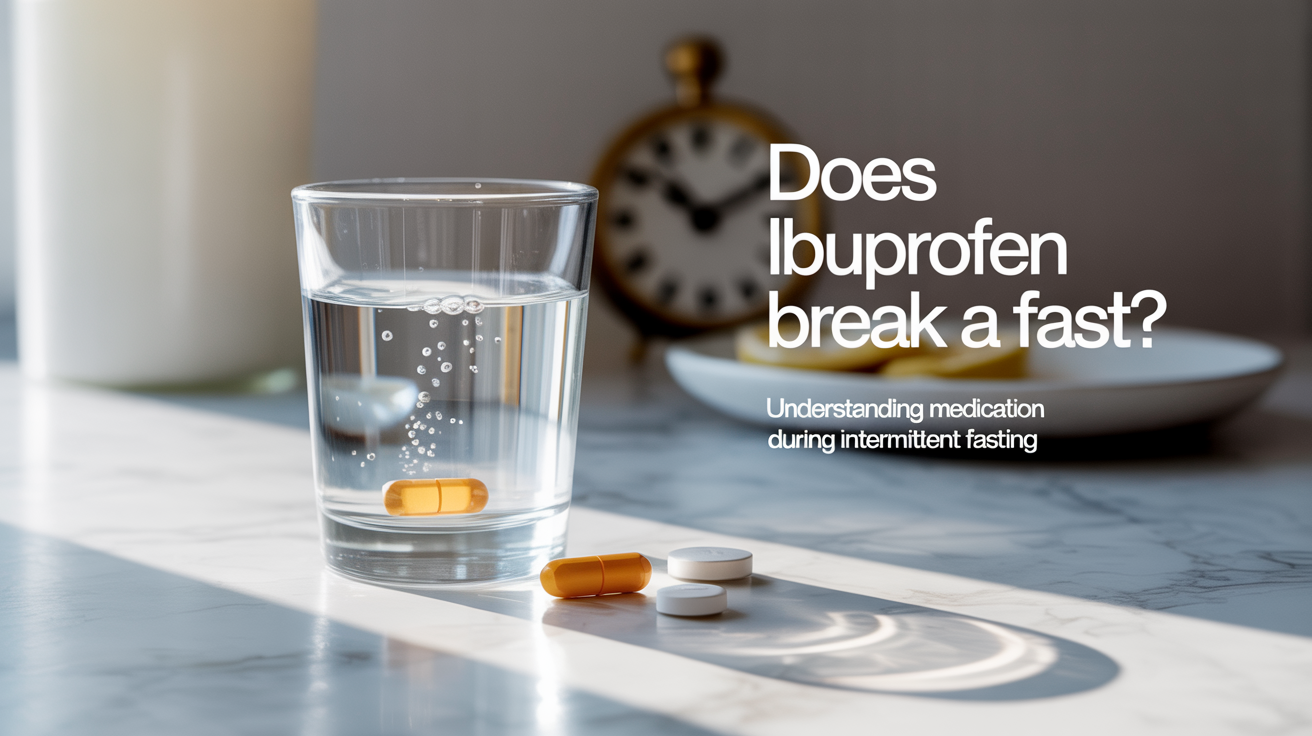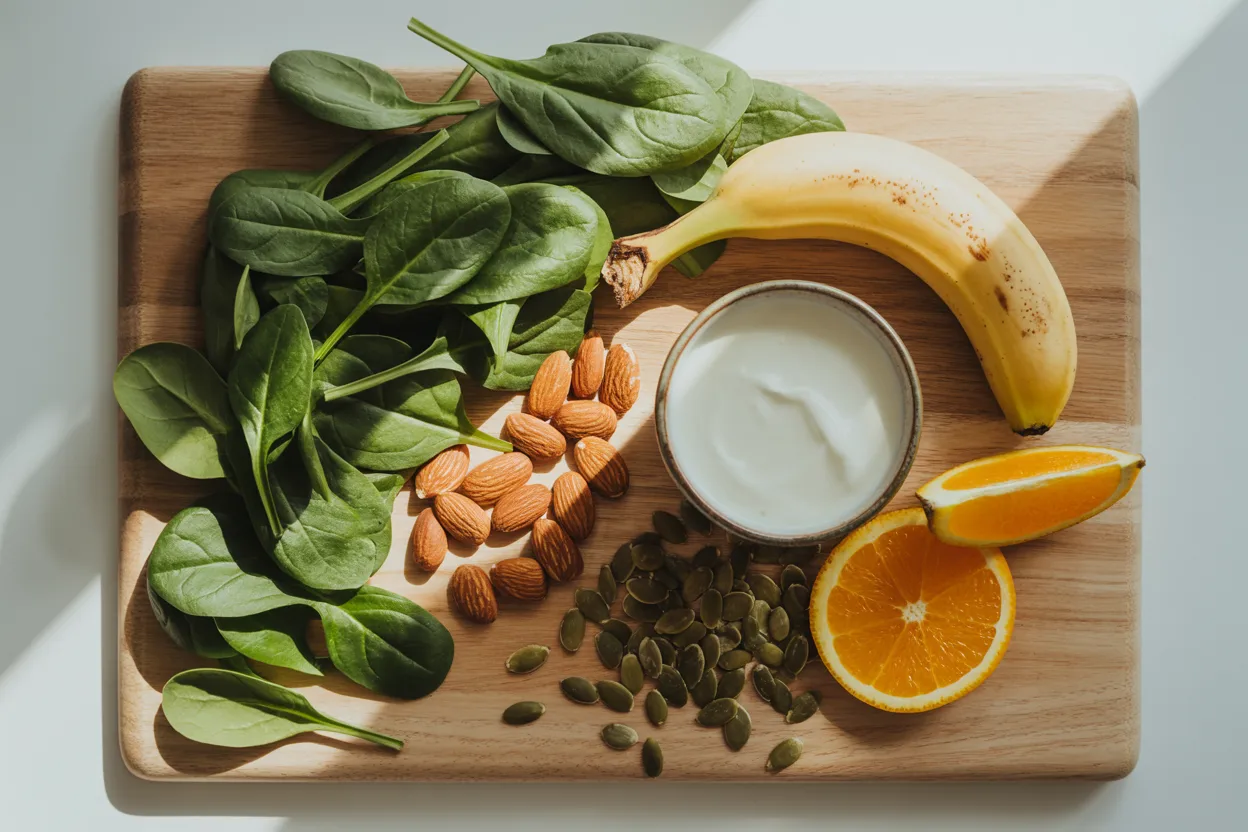You’re 15 hours into a fast. The mental fog creeps in, tension builds behind your eyes, and you open the cabinet for relief. One tablet of ibuprofen. A quick swallow, a sip of water—and then the thought hits: did I just ruin my fast?
From a calorie standpoint, probably not. But fasting isn’t only about calories. It’s also about what’s happening beneath the surface with your hormones, cellular repair, gut health, and even how your body handles stress. The answer depends on which goal matters most to you.
The Calorie View: Technically, No
If your definition of breaking a fast is purely caloric, ibuprofen doesn’t count. A standard 200 mg tablet contains essentially zero calories. It won’t spike blood sugar, affect insulin, or “feed” your cells. In that sense, your fast remains intact.
But most people fast for more than calorie math. They’re chasing better insulin sensitivity, reduced inflammation, or the mental clarity that comes from an empty stomach. And that’s where the details start to matter.
The Goal-Based View: Minimal Metabolic Impact—but Watch the Gut
Ibuprofen isn’t food, but it’s far from inert. It alters how your body produces prostaglandins, which are the molecules that regulate inflammation, pain, and protect your stomach lining. By blocking the cyclooxygenase (COX) enzymes that make those prostaglandins, ibuprofen cools inflammation but also weakens the gut’s natural defense system.
So while it doesn’t send insulin or glucose signals that interrupt fat burning or autophagy, it can interfere with fasting goals tied to gut health, recovery, and comfort. That’s why “Does ibuprofen break a fast?” often turns into “Is ibuprofen smart to take while fasted?”
What Happens in the Gut: NSAIDs and the Empty Stomach Problem
When you take ibuprofen on an empty stomach, it’s absorbed faster—but at a cost. Let’s look at what research shows:
- Prostaglandins protect the stomach. NSAIDs suppress them, thinning the mucus layer and lowering blood flow in gastric tissue. Less protection means more irritation potential.
- Empty stomach = higher exposure. In fasting conditions, ibuprofen reaches a higher peak concentration and faster absorption rate compared to the fed state. That’s why you feel relief sooner—but also why the lining feels it more sharply.
- Animal and human data align on irritation risk. In animal studies, fasting intensified NSAID-induced ulcers. Human clinical guidance still echoes: take with food when possible.
- Chronic use raises ulcer rates. Long-term NSAID use (3 months +) produces visible gastric erosions or ulcers in up to 35 % of patients; ibuprofen sits on the lower-risk end but not at zero.
- Fasting + NSAIDs = higher ulcer complications in some settings. During Ramadan, studies observed more perforated ulcers among fasting individuals using NSAIDs. It’s correlation, not blame, but still a caution flag.
The pattern is clear: ibuprofen itself doesn’t end a fast metabolically, but it makes your gut more vulnerable when there’s no food cushion.
When It’s Reasonable to Use Anyway
Sometimes, relief matters more than rules. A pounding headache or low-grade fever can derail your focus and push you to break the fast entirely. In those moments, taking one standard OTC dose may help you stay the course.
If your primary fasting goal is weight management or habit adherence, ibuprofen isn’t your enemy. What matters is context: frequency, hydration, and total dose. Short-term, occasional use won’t undo your fasted state or throw your hormones off.
If you’re fasting for deep autophagy, gut healing, or chronic inflammation, it’s worth holding out until your eating window or finding a non-drug workaround.
How to Use Ibuprofen Safely While Fasting
You can keep the risk low with a few deliberate choices:
- Use the smallest effective dose. For most adults, that’s 200–400 mg. Skip stacking doses unless directed by a clinician.
- Always take with a full glass of water. It dilutes the concentration and helps protect the stomach lining.
- Avoid combining with alcohol or multiple NSAIDs. This doubles ulcer and bleeding risk.
- Time it near your first meal if you’re prone to reflux or ulcers. Taking it 15–30 minutes before breaking your fast lets incoming food buffer the stomach.
- Watch for warning signs: heartburn, dark stools, or abdominal pain mean stop and reassess.
If those symptoms appear more than once, your fasting plan should adapt—not your pain tolerance.
Alternatives: Pain Relief Without the Gut Stress
- Acetaminophen (Paracetamol): gentler on the stomach since it spares COX-1, but it can tax the liver if overdosed or mixed with alcohol. Use caution if fasting heavily or nutrient-depleted.
- Topical NSAIDs: diclofenac or ibuprofen gels deliver local relief for muscle or joint pain with far less systemic absorption—and almost no gut contact.
- Non-drug strategies: hydrate, stretch, or use ice and heat therapy. A small magnesium glycinate supplement (taken with food in your window) can reduce muscle tension and headaches naturally.
- Caffeine + movement: light activity and hydration often relieve tension headaches caused by low circulation or caffeine withdrawal during fasts.
The goal isn’t to tough out pain, but to manage it intelligently so you don’t compromise your fast or your health.
The Medication Caveat: When to Talk to a Clinician
Fasting changes physiology, but ibuprofen’s side effects don’t care about trends. If you fit any of these categories, check in with a healthcare provider before taking NSAIDs fasted:
- Taking anticoagulants (warfarin, apixaban, etc.)
- On corticosteroids or SSRIs (compounding bleed risk)
- History of ulcers or GI bleeds
- Kidney disease, heart failure, or pregnancy
In fasted states, blood volume and renal perfusion drop slightly, meaning NSAIDs can reduce kidney filtration even more. One or two tablets rarely matter for healthy people, but chronic use can stack consequences.
So… Does Ibuprofen Break a Fast?
Technically, no. It’s calorie-free and metabolically neutral in small doses.
Functionally, maybe. If your fast’s purpose is gut rest or autophagy, you’re interrupting that rhythm.
Think of ibuprofen as neutral on metabolism, potentially rough on the stomach. If your fast is about habit and focus, then go ahead when necessary. If your fast is about cellular repair, delay it until your meal.
Your fast isn’t broken, but your stomach might be irritated.
Make Fasting Personal with the Fasting App by Municorn
Your fasting experience is unique—so track it like one. Log when you take medications, note symptoms like headaches or heartburn, and see patterns emerge. The Fasting App by Municorn lets you compare “medication days” versus “clean fast” days across energy, cravings, and focus. Two weeks of entries can show you exactly how ibuprofen—or any supplement—affects your fast.
Because the best fasting plan isn’t the strictest one. It’s the one that works for your body.




